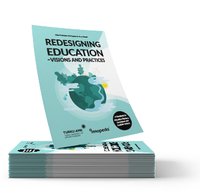
Sustainable future should be a common goal
In May, Principal Lecturer and Senior Advisor at TUAS, Taru Konst, and Executive Lecturer Liisa Kairisto-Mertanen, who retired in early spring, published the book Redesigning Education – Visions and Practices (2020).
The duo’s earlier work includes, among others, a handbook on innovation pedagogy titled Innovation Pedagogy – Preparing Higher Education Institutions for Future Challenges (2018). In the new book, innovation pedagogy is not the research subject, but is presented as a longed-for solution and example on the change process of an organization.
In their new book, Konst and Kairisto-Mertanen, who have published several articles on innovation pedagogy, challenge everyone working in higher education to re-evaluate the development directions of education.
There is a great need for common discussion on values and especially a goal-oriented change towards a sustainable future.
Sustainable development should be more than rhetoric
“Lately, higher education has been renewed under tremendous pressure to change. For example, degree programmes have reacted in an exemplary way to the demands of digitalization and the changing working life”, Taru Konst describes the idea behind the book.
“But the most important issue – sustainable development, the prerequisite for safeguarding living conditions on Earth – has been almost completely neglected.”
The book challenges decision-makers at higher education institutions to really consider how sustainable development is substantiated in the everyday lives of students.
At most higher education institutions, the terms “ecological” and “sustainable development” have been hidden as beautiful words in strategies and value clouds.
The words are not yet turned into action in the studies and the everyday life of higher education institutions. Rethinking higher education, visions and practical acts are what is required, all the way from the executive management.
“The need for quick and even radical changes cannot be signed off as the “opinion” of us writers”, Konst emphasizes. Several recent studies repeat the same message: the sustainability crisis and climate change are the biggest questions of our time, and they should be handled at all levels of society.
“Higher education institutions cannot just stay and watch what will happen or try to adapt to the change. We must play an active part in solving the shared crisis.”
Today’s students are the decision-makers of the future
Ecological and ethical actions are themes which are often brought up in curriculum work, especially at the levels of early childhood and basic education. When talking about the future, attention is often paid to children and youths. However, the sustainability crisis tests the entire society and all its age groups.
Those currently studying in higher education are the ones who are expected to yield solutions to the problems created by the climate crisis.
“The visibility of the climate theme in early childhood and basic education is obviously important, but it is at least equally important to bring it to higher education”, says Konst. “How could the students otherwise develop their competences to solve challenges like the climate crisis?”
Additionally, it should be noted that students have also expressed the wish to have the sustainability theme more pronounced in their studies.
“The last part of the book presents the change process, or how to implement the change in the thinking and action of the entire organization. In describing change management, we use innovation pedagogy as an example, and with the same logic the change can be implemented also in terms of sustainable development.”
“15 years ago, we had no idea that the innovation pedagogy we were developing would in the future permeate the entire TUAS. However, now innovation pedagogy is a part of our everyday life and thinking. Similar work is now required to promote a sustainable future”, Konst envisions.
Download the book from Loki
The book Redesigning Education – Visions and Practices (2020) can now be downloaded from Loki .

